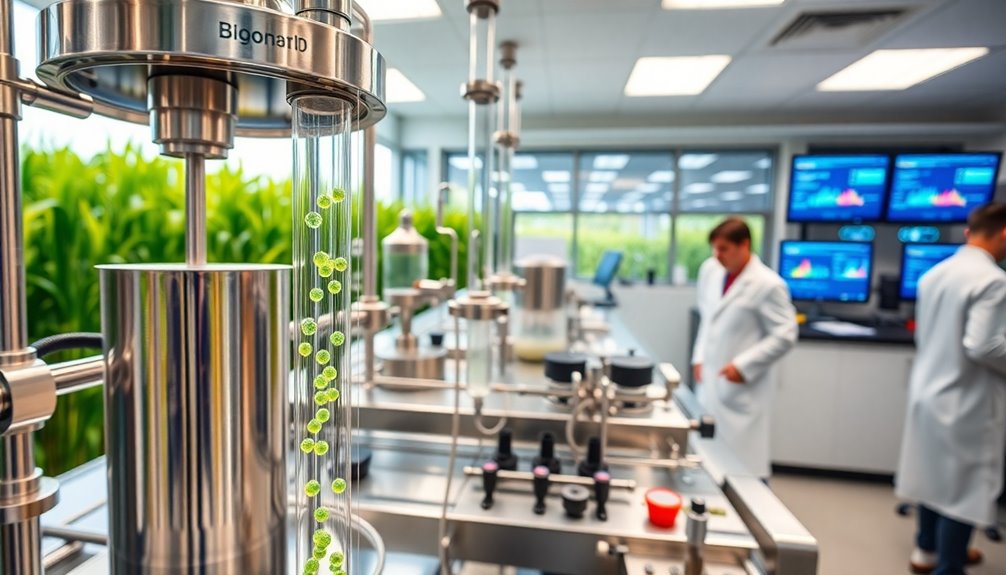Online product separation technology significantly boosts biobutanol production efficiency. By continuously removing solvents from fermentation broths, this method maintains higher solvent concentrations, leading to improved yields. It also reduces the toxic effects on the fermentation process, enhancing overall efficiency. This innovative approach streamlines production, making biobutanol a more viable alternative to fossil fuels. If you want to uncover more about the latest advancements in biobutanol production, you'll find fascinating insights ahead.
Key Takeaways
- Online product separation technology continuously extracts biobutanol from fermentation broth, preventing product inhibition during the fermentation process.
- By maintaining higher solvent concentrations, this technology directly enhances overall biobutanol yield.
- Continuous separation mitigates the toxic effects of biobutanol on microbial fermentation efficiency.
- Streamlining the production process through online separation improves operational efficiency and reduces production costs.
- Integrating this technology with advanced fermentation methods can lead to significant advancements in biobutanol production.

As you explore sustainable energy solutions, biobutanol stands out as a promising biofuel that can effectively replace fossil fuels, contributing to a greener economy. However, the path to efficient biobutanol production isn't without its challenges. High production costs, low solvent concentrations, and product inhibition often hinder its viability. By harnessing online product separation technology, you can significantly enhance biobutanol production efficiency and tackle these obstacles head-on.
Biobutanol presents a sustainable alternative to fossil fuels, yet overcoming production challenges is essential for its success.
Current production methods, particularly the Acetone-Butanol-Ethanol (ABE) fermentation using *Clostridium* species, have laid the foundation for biobutanol production. Yet, you must recognize that the choice of substrates plays a crucial role in determining yield and efficiency. Utilizing underutilized biomass, like agricultural and municipal waste, can help reduce production costs while promoting sustainability. Furthermore, the exploration of various fermentation technologies has opened new avenues for enhancing biobutanol production.
Moreover, pretreatment methods, such as steam explosion, can improve substrate accessibility, further enhancing fermentation efficiency.
Online product separation technology offers a revolutionary approach to overcome product inhibition during fermentation. By continuously separating biobutanol from the fermentation broth, you're able to maintain higher solvent concentrations in the system, which directly improves yield. This technique not only mitigates the adverse effects of product toxicity but also allows for a more streamlined and efficient production process.
When combined with advancements in genetic engineering, the potential for improved biobutanol production becomes even more significant. Developing robust *Clostridium* strains that can tolerate higher butanol concentrations can transform production capabilities.
Moreover, implementing mutation breeding and evolutionary engineering can enhance strain performance, ensuring optimal fermentation conditions.
Frequently Asked Questions
What Is the Environmental Impact of Biobutanol Production?
Biobutanol production has a positive environmental impact by significantly reducing greenhouse gas emissions and providing a cleaner alternative to fossil fuels.
You're contributing to sustainable energy by utilizing waste materials, which minimizes pollution and resource loss.
However, keep in mind that high production costs and microbial toxicity can challenge efficiency.
How Does Biobutanol Compare to Traditional Fuels?
Did you know biobutanol can reduce greenhouse gas emissions by up to 30% compared to traditional fuels?
When you compare biobutanol to gasoline, you'll find it has a higher octane number, improving combustion efficiency.
Plus, its immiscibility with water makes it less likely to contaminate groundwater.
While its energy density is lower than gasoline, its compatibility with standard engines and ability to blend seamlessly without separation makes it a compelling alternative.
What Are the Main Applications of Biobutanol?
Biobutanol has various applications across multiple sectors.
You'll find it used as a cleaner fuel alternative blended with gasoline, and it serves as an industrial solvent, offering a sustainable substitute for petroleum-based options.
In construction, it improves cement quality and is a key ingredient in paints and coatings.
Additionally, biobutanol plays a role in producing biodegradable plastics, adhesives, and even as a bio-based material in pharmaceuticals, showcasing its versatility and environmental benefits.
What Are the Costs Associated With Biobutanol Production?
When you dive into biobutanol production, you'll encounter a tapestry of costs woven from feedstocks, labor, and technology.
Setting up a plant can feel like a hefty investment, often exceeding $100 million. The price of raw materials, like Sweet Sorghum Bagasse at around $50/ton, influences your bottom line.
Operating costs, including utilities and labor, can fluctuate, affecting the overall price you'll pay for biobutanol, which ranges from $0.42 to $1.14 per kilogram.
Who Are the Key Players in the Biobutanol Market?
In the biobutanol market, you'll find key players like Abengoa, Celtic Renewables, and Cathay Industrial Biotech, each contributing unique innovations.
Eastman Chemical Company and Gevo Inc. also play significant roles, focusing on renewable fuels and chemical production.
These companies drive advancements in biobutanol production, catering to various applications such as coatings, adhesives, and biofuels.
Their ongoing efforts reflect the growing demand for sustainable energy solutions and the importance of environmental responsibility.
Conclusion
In summary, embracing online product separation technology can be the compass guiding you toward higher biobutanol production efficiency. By streamlining processes and enhancing yield, this innovative approach not only simplifies your operations but also maximizes profitability. As you navigate the landscape of biofuels, remember that leveraging cutting-edge technologies can transform challenges into opportunities, much like a river carving its path through solid rock. So, don't hesitate—let this technology propel your biobutanol production to new heights.









